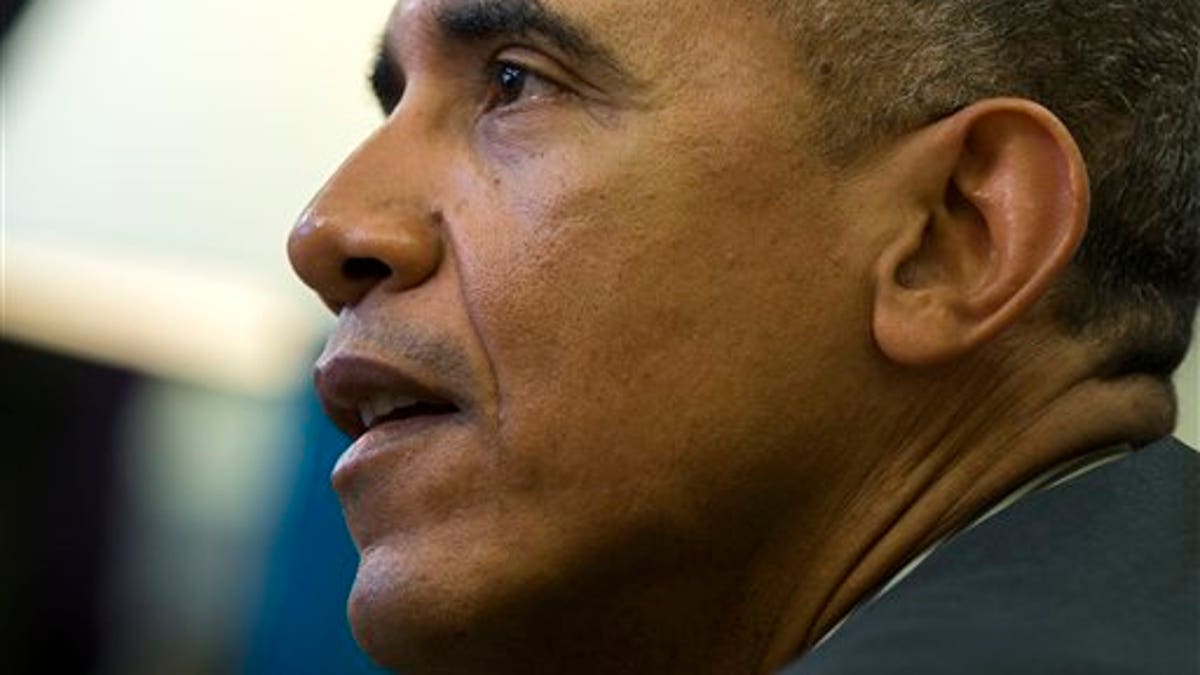
President Barack Obama meets with a group of immigration advocates in the Oval Office of the White House in Washington, Wednesday, Feb. 4, 2015. (AP Photo/Evan Vucci)
It’s still early in the legal battle over President Obama’s sweeping immigration actions, but so far the score is clear: The Constitution 1, an impatient president, 0.
Last night, Federal District Court Judge Andrew Hanen ordered a temporary halt to President Obama’s so-called “Deferred Action for Parents of Americans and Lawful Permanent Residents” (DAPA), holding that the president’s program failed to comply with the Administrative Procedures Act.
The decision itself comprehensively demonstrates how the president’s immigration actions impose considerable direct costs on the states (the cost for additional drivers’ licenses alone run into the millions), and the court showed again and again how the administration’s own prior legal arguments cut against its current position.
Critically, the court also found that the Obama administration had essentially “abdicated” its “statutory duties to enforce immigration laws.” As the court explained, “Congress has clearly stated that illegal aliens should be removed . . . the DHS program circumvents immigration laws and allows individuals that would otherwise be subject to removal to remain in the United States.”
The court’s meaning is clear: The president’s action directly contradicts his legal duty.
On the merits, the court accurately found that DAPA is no mere exercise of “prosecutorial discretion.” As the court said, “Non-enforcement is just that -- not enforcing the law. Non-enforcement does not entail refusing to remove these individuals as required by the law and then providing three years of immunity from that law, legal presence status, plus any benefits that may accompany legal presence under current regulations.” (Emphasis in original.)
The court’s meaning is clear: The president’s action directly contradicts his legal duty.
These findings are similar to the arguments I made in testimony before the House Judiciary Committee in December and in the ACLJ amicus brief I filed on behalf of 68 Members of Congress, including the chairman of the House Judiciary Committee, Rep. Bob Goodlatte, and both senators from Texas, Ted Cruz and John Cornyn.
The court’s meaning is clear: The president’s action directly contradicts his legal duty.
The court went on to note that the administration’s policies represented a “massive change in immigration practice” that would affect “the nation’s entire immigration scheme and the states who must bear the lion’s share of its consequences.”
The administration was claiming expansive discretion when the “detailed and mandatory commands [of applicable law] circumscribe discretion.” The executive branch simply doesn’t have the power to “directly and substantially contravene statutory commands.”
All of this is matter of constitutional common sense. The president can’t disregard his statutory duties simply because he prefers different regulations and has different priorities.
This decision represents a victory for the rule of law, for plain English, and for the core American constitutional concept of the Separation of Powers.
The President of the United States has expressed his impatience with Congress, demanding that it enact comprehensive immigration reforms that advance his own ideological agenda, and when Congress “failed” to follow his commands, he acted unilaterally.
But as I’ve said many times, impatient presidents don’t get to make law.
And we must never forget that President Obama’s impatience is itself disingenuous. For the first two years of his presidency, his party commanded filibuster-proof majorities in the House and Senate, yet he chose not to act on immigration reform. Instead, he prioritized ObamaCare and a pork-laden stimulus package.
As the grandson of Russian immigrants, I’m not only aware of the immense contributions of immigrants to our nation, I’m also aware of the need for immigration reform. But our Constitution exists for a reason, and reforms impacting not just the millions of illegal immigrants already in this country, but also hundreds of millions of American citizens (and our national economy) must be enacted through constitutional processes.
This battle is far from over. The president is already vowing to appeal, and it’s likely that the final word will once again rest with the Supreme Court of the United States. But even in lengthy litigation, with courts issuing opinions at every level, well-reasoned and comprehensive lower-court opinions can exercise enduring influence.
We now press on to the next stage -- to the Courts of Appeal -- where once again the president will have to explain how a mere executive branch memorandum can revise and fundamentally alter comprehensive statutory schemes, statutory schemes drafted in compliance with constitutional mandates that vest in Congress -- not the President -- the exclusive authority to “establish a uniform Rule of Naturalization.”
